
SDG 12 in Saudi Arabia: Responsible Consumption and Production
Sustainable Development Goal 12 (SDG 12) focuses on ensuring sustainable consumption and production patterns. In Saudi Arabia, addressing SDG 12 is vital due to its high per capita resource consumption and significant reliance on natural resources. Through Vision 2030, the Kingdom has introduced transformative policies and initiatives to promote responsible resource use, waste reduction, and sustainable production practices.
Efforts by the Saudi Government to Achieve SDG 12
- Waste Management and Recycling:
- Saudi Arabia has implemented comprehensive waste management strategies, including the expansion of recycling programs and the development of waste-to-energy projects.
- Initiatives like Saudi Investment Recycling Company (SIRC) aim to recycle 85% of industrial and municipal waste by 2035.
- Sustainable Resource Use:
- Water conservation programs, including modern irrigation techniques and water reuse projects, address the Kingdom's scarce water resources.
- Energy efficiency measures, such as retrofitting buildings and adopting green technologies, reduce energy consumption across sectors.
- Promoting Circular Economy:
- The government encourages the adoption of a circular economy model, focusing on resource efficiency, reduced waste, and extended product life cycles.
- Industrial sectors are incentivized to adopt sustainable practices, including eco-design and resource-efficient manufacturing.
- Sustainable Tourism and Events:
- Saudi Arabia promotes sustainable tourism by integrating environmental preservation and cultural heritage conservation into its tourism projects, such as NEOM and AlUla.
- Efforts to make major events, such as the Saudi Seasons, environmentally sustainable include waste reduction and eco-friendly infrastructure.
- Public Awareness and Education:
- Campaigns such as "No Food Waste" raise awareness about reducing food waste and encourage responsible consumption among citizens.
- Educational programs target youth and communities, promoting sustainability practices and environmentally conscious lifestyles.
- Regulations and Policies:
- The government has introduced regulations for sustainable production and consumption, including bans on single-use plastics and incentives for businesses adopting eco-friendly practices.
- The Saudi Green Initiative aligns national efforts with global sustainability goals by promoting renewable energy and carbon reduction strategies.
- Sustainable Procurement:
- Public and private sectors are encouraged to adopt sustainable procurement policies, prioritizing goods and services with minimal environmental impact.
SDG 12 at Imam Mohammad Ibn Saud Islamic University (IMSIU)
Imam Mohammad Ibn Saud Islamic University (IMSIU) actively contributes to SDG 12 by fostering a culture of sustainability on campus, integrating responsible consumption and production into its operations, and promoting environmental awareness through education and research.
- Waste Reduction and Recycling:
- IMSIU implements waste management systems on campus, including recycling stations and composting initiatives for organic waste.
- Campaigns encourage students and staff to minimize waste and participate in recycling programs.
- Energy and Water Conservation:
- The university adopts energy-efficient technologies and promotes water-saving practices to reduce resource consumption.
- Awareness campaigns educate the campus community about the importance of conserving energy and water.
- Sustainable Campus Operations:
- IMSIU integrates sustainability principles into campus infrastructure, including the use of eco-friendly building materials and renewable energy sources.
- Sustainable procurement policies prioritize environmentally friendly products and services.
- Education and Research:
- Courses on sustainability, environmental science, and resource management equip students with knowledge about responsible consumption and production.
- Faculty and students engage in research on topics such as waste reduction, circular economy models, and sustainable supply chains.
- Community Engagement:
- IMSIU extends its efforts beyond the campus through community outreach programs that promote responsible consumption and sustainable living practices.
- Partnerships with local organizations and government agencies enhance the university's impact on sustainability goals.
- Islamic Perspective on Sustainability:
- The university integrates Islamic teachings on moderation and resource stewardship into its sustainability initiatives, emphasizing ethical consumption and care for the environment.
- Workshops and events highlight the alignment of Islamic values with global sustainability efforts.
Impact of IMSIU's Contributions to SDG 12
Through its focus on sustainable operations, education, and community engagement, IMSIU supports Saudi Arabia's progress toward SDG 12. By promoting responsible consumption and production, the university prepares students to adopt sustainable lifestyles and contribute to the Kingdom's broader sustainability goals under Vision 2030. IMSIU's initiatives demonstrate how academic institutions can lead by example in advancing global sustainability efforts.
The College of Computer and Information Sciences at Imam Muhammad bin Saud Islamic University launched the (Giving with Your Device) initiative today, Wednesday 30/8/2023.
https://imamu.edu.sa/news/Pages/news_30_8_2023.aspx
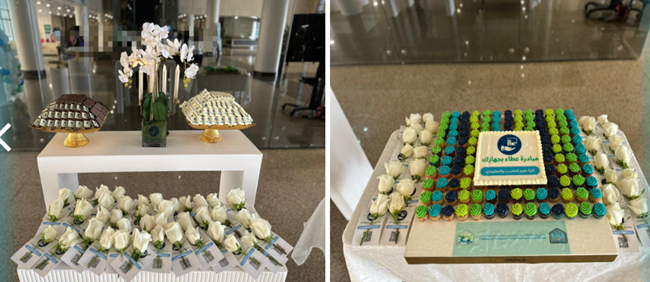

The Dean of the College, Dr. Talal Al-Balawi, stressed that this initiative targets the college's employees, including faculty members, administrators, and male and female students, as Dr. Al-Balawi pointed out that this initiative came to make full use of computers by recycling them, to reduce material waste and rationalize consumption, and the initiative also seeks to raise the level of awareness of individuals, enhance social responsibility, and enable people with special circumstances from college students to obtain devices that suit their own needs, by donating a device or contribute to the inspection and evaluation of devices and configure them for a new user.
The launch of the initiative included a visual presentation explaining the initiative and explaining its objectives.
The inauguration was attended by the Vice Dean of the College, Dr. Maria Al-Otaibi, the Social Worker from the Psychological and Social Counseling Unit at the College, Dr. Nahed Al-Raisi, and the Head of the College's Laboratories, Ms. Al-Hanouf Al-Arini, along with the college's leaders and employees.
Disposal of Radioactive Waste
https://units.imamu.edu.sa/committees/Pcpep/fileslibrary/Pages/%D9%85%D9%83%D8%AA%D8%A8%D8%A9-%D8%A7%D9%84%D9%85%D9%84%D9%81%D8%A7%D8%AA-%D8%AA%D8%AC%D8%B1%D9%8A%D8%A8%D9%8A-777.aspx
| Disposal of radioactive waste |
| |
| |
| Radioactive waste disposal facilities |
| A collection of books and articles on radiation prevention and safety |
| Publications and publications |
| |
Student Affairs Agency Organizes Workshop Entitled Recycling Materials
https://units.imamu.edu.sa/deanships/sa/news/Pages/news1437-53.aspx
The deanship of student affairs, represented by the student affairs agency, was organized under the supervision of the department of activities and student clubs workshop entitled (recycling materials) in the building of the slippers.
from Sunday, april 21, 1437 to Monday
The workshop aims to develop the creative and artistic aspect by recycling
materials and benefit from them by making different artistic forms.


The Deanship Agency for Student Affairs organizes an art workshop entitled synthesis of materials
https://units.imamu.edu.sa/deanships/sa/news/Pages/news38-167.aspx
The deanship of student affairs, represented by the deanship agency for student affairs under the supervision of the department of student programs and activities, organized a technical workshop entitled synthesis of materials from tuesday, july 21, 1438 ah to thursday, july 23, 1438 h. 323.
The workshop aims to educate students about the importance of preserving the environment and recycling consumed materials and materials, and how to synthesize materials from the environment to produce reusable works of art.

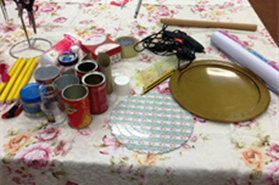

World Green Economy Dayhttps://imamu.edu.sa/news/Pages/news-15-2-1441-3.aspx
In celebration of this day, the Economics Club at the Faculty of Economics and Administrative Sciences organized the World Green Economy Day event in partnership with the National Environment Recycling Company in the fields of e-waste, on Monday morning, 15/2/1441 AH, which is located in the main lobby of Building (322).
The four-day event aims to educate students about the importance of disposing of e-waste in an environmentally friendly way, and its contribution to raising the economy by producing a clean energy source through the recycling of those wastes, and the recycling corner of the private environment contained fires and information explaining the idea of the company, which is important in recycling e-waste in an environmentally friendly way, in addition to placing containers to collect e-waste to be recycled and produce renewable energy from it after the end of the event.
Within the same event, the Environment Club was inaugurated at the Deanship of Student Affairs for Female Students' Affairs, through which the vision, mission and objectives of the club were clarified to seek a healthy environment free of pollution in a conscious society, improve human behavior in the use of harmful objects to the environment, and to educate students about the damage of environmental pollution.
The event focused entirely on encouraging the adoption of sound environmental behavior to drive sustainable development.
The Department of Physics in king Abdullah city for Female students organizes the activity of "electronic waste" to improve the efficiency of dealing with electronic waste
https://units.imamu.edu.sa/colleges/science/news/Pages/news26-11-2018.aspx
The department of physics at imam mohammed bin saud islamic university organized a cultural activity entitled "e-waste in cooperation with daz saudi factory and the civil environment recycling company to support the activity with information and flyers on thursday, february 14, 1440 ah, november 22, 2018 in panorama building 323 from 9 to 11 p.m. the campaign was supervised by Marvat al-zamia, coordinator of the department of physics, faculty member and follow-up of Ahlam al-hawiti, activity supervisor and faculty member, and the coordination of Saji Al-qaseer with a group of students from the faculty of science.
Electronic and electrical waste is one of the most threatened wastes for the environment and human life because it contains more than 1,000 different substances, mostly toxic components. when these devices are disposed of randomly, their components seep from toxic elements into natural resources from water, water, water, soil, etc.
From this point of view, the students of the electronics laboratory from the department of physics carried out an awareness activity and an introductory corner aimed at raising awareness of the dangers of e-waste.
This campaign aims to introduce electronic waste and raise awareness of its problems and damage by identifying the environmental impacts of mismanagement of electronic waste.
At the end of the Campaign, h.e. Department Coordinator Marvat Al-zamia thanked the officials and organizers of this activity, as well as to his excellency the dean of the faculty, Dr. mohammed al issa, and his excellency the head of the department of physics, Dr. ahmed Al-qaoud, and his excellency the faculty of science undersecretary Dr. Abeer Al-nahdi for supporting such important scientific activities in promoting a positive and sound view of electronic waste and recycling methods.
The students expressed their happiness and gratitude to the faculty of science and the department of physics, which provided them with the opportunity to participate and organize.
It is worth mentioning that the department of physics offers great thanks, appreciation and great gratitude to Saji Al-qaseer and the team for their fruitful efforts in improving the efficiency of dealing with electronic waste, asking them to reconcile and pay.
Thanks to h.e. secretary of the department of physics a. hana al-jumai for her concrete efforts in coordinating such successful initiatives.
To view previous scientific visits to the department of physics over the past year: link
To view the previous scientific activities of the department of physics over the past year: link
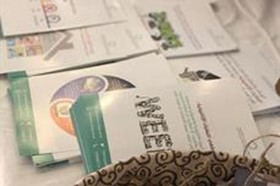
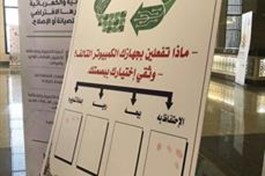
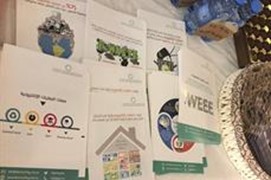


The Department of Biology evaluates the World Environment Week event
https://units.imamu.edu.sa/colleges/science/news/Pages/new2-4-2019-1.aspx
Within the framework of the celebration of the World Environment Week, the Department of Biology, represented by a number of faculty members, namely: Dr. Hassan Redini, Head of the Department, Prof. Fawzi Hawala, Undersecretary of the Department, and Dr. Mohammed Al-Zahrani, met with a number of students of the Department on Wednesday, 20 Rajab 1440 corresponding to March 27, 2019.
At the beginning of the meeting, the Head of the Department welcomed the students and thanked them for their presence and interest, and then made a presentation that included the introduction of the World Environment Week and its objectives. This week is an essential mechanism for the United Nations to promote global awareness and action for the environment, and this day has been growing over the years to become a global platform for public awareness celebrated by stakeholders in more than 100 countries on a large scale, as well as a day to celebrate people who do positive work towards the environment, and to sharpen individual actions to form collective forces that generate a steady positive impact on the planet. This year's World Environment Day theme is about plastics under the theme "Overcoming Plastic Pollution".
The Kingdom of Saudi Arabia has a Ministry of Environment, the Ministry of Environment, Water and Agriculture.
Among the objectives of this week are:
1- Raising awareness of the importance of preserving the environment.
2- Activating the role of government and private institutions and charities in preserving the environment
3 - Raising the responsibility of individuals towards the environment and the impact on them.
4- Contribute to the reduction of environmental pollution.
In conclusion, the Head of the Department renewed his thanks to the students of the Department for their interest and motivation to take greater care of the environment and spread the culture of preserving it in order to ensure its sustainability and enjoyment of its aesthetics.
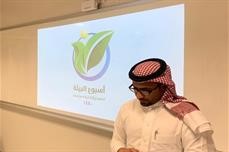

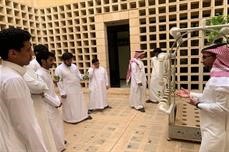
Green Chemistryhttps://units.imamu.edu.sa/committees/Pcpep/news/Pages/%D8%A7%D9%84%D9%83%D9%8A%D9%85%D9%8A%D8%A7%D8%A1-%D8%A7%D9%84%D8%AE%D8%B6%D8%B1%D8%A7%D8%A1.aspx
American chemists Paul Anastas and John Warner put forward in the book "Green Chemistry Theory and Practice" 12 principles that are conditions that must be met for chemistry to be "green." Among these principles is the need to adopt manufacturing methods that do not produce substances that are highly toxic to humans and other living organisms and to reduce chemical residues whose mass in some conventional manufacturing processes exceeds hundreds of times the size of the product itself.
For example, according to a 2003 study, making a single computer chip requires materials up to 630 times the size of the same chip, while cars require twice as much weight as different materials.
Another principle of green chemistry is to use renewable primary resources and reduce dependence on non-renewable resources such as oil, while ensuring that manufacturing processes are conducted at normal temperature and pressure to reduce energy consumption.
Manufactured chemicals must also be easily biodegradable by the influence of natural factors into compounds that are harmless to the environment to prevent these manufactured substances from becoming pollutants of the environment, as is the case with plastic products, whose accumulation as a result of their slow decomposition has led to serious environmental damage from which the oceans have not been spared, and represent a danger to living organisms whose effects extend over decades.
Applications
Applying the principles of green chemistry and with the aim of reducing waste production, depleting natural resources and maintaining a healthy environment, the researchers came up with the design of new manufacturing methods that respond to these conditions.
For example, finding a natural alternative to polymers extracted from oil products widely used to produce substances harmful to the environment and human health such as plastic bags, polysaccharides that can be extracted from potatoes, cereals and many plants, will enable these natural polymers to manufacture biodegradable materials without harming the environment.
To manufacture food colorants and flavorings, the researchers developed a new technique based on starch-derived glucose to replace the currently widely used chemicals that are not without risks to human health and whose manufacturing process generates a lot of contaminated substances.
Researchers in the field of green chemistry have invented new techniques to conduct chemical reactions, including the technique of using ultrasound in chemical manufacturing, and this technique works to achieve the principle of economy of atoms and stimulates the reaction to take place in a short time and have a high yield compared to traditional methods.
The technique of using carbon dioxide in a supercritical state – an intermediate state between liquids and gases – as a solvent is also one of the most promising techniques in the field of sustainable chemistry, and this technique allows to increase the yield of reactions, reduce the quantities of chemicals exploited in the chemical and textile industries, as well as reduce the natural resources consumed in these industries.
Nike recently announced its reliance on carbon dioxide in an above-critical state as a solvent in fabric dyeing operations at one of its factories in Taiwan, and the technology will provide large quantities of water estimated at 150 liters of water consumed to make a single shirt.
For their part, research centers are developing new scientific techniques that help to manufacture consumer products without harming the environment, and in the past decade many scientific journals specialized in the field of green chemistry have emerged to encourage researchers to produce scientific in this field.
However, the sometimes high cost of some of these technologies remains the main obstacle to the manufacture of alternative materials, at least at the current stage, but the issue of preserving natural resources and maintaining a clean environment has become a growing concern for both people and governments and will push for the adoption of these technologies in the future.
Will green chemistry succeed in repairing what industrial chemistry has corrupted for more than a century (citing Environmental News)?
Imam Mohammad bin Saud Islamic University (IMSIU) plays a pivotal role in advancing Sustainable Development Goal 12 (SDG 12), which focuses on promoting responsible consumption and production patterns. Through its comprehensive initiatives, including those led by the Nutrition Department, as well as its effective waste management strategies, the university is fostering a culture of sustainability. IMSIU's efforts not only impact its student body but also contribute to broader national sustainability goals, aligning with Saudi Arabia's Vision 2030.
Nutrition Department's Contribution to Responsible Consumption
The Nutrition Department at Imam Mohammed Ibn Saud University, operating under the Vice Dean of Student Affairs, ensures that sustainable and healthy consumption practices are embedded in student services, particularly through the management of cafeteria services and nutrition programs. Key contributions include:
- Healthy Food Provision: The department ensures that meals provided in university cafeterias are nutritious, well-balanced, and in line with health guidelines. These initiatives aim to promote healthy living while supporting responsible food consumption.
- Education on Healthy Eating: The department actively promotes awareness among students about the importance of healthy eating habits, encouraging responsible consumption through nutritional education programs and awareness campaigns.
- Affordable Nutrition: Recognizing the financial challenges faced by students, the department offers meals at nominal prices, making healthy food accessible to all students, thus supporting both well-being and sustainability.
Responsibilities of the Nutrition Department:
- Cafeteria Supervision: The department oversees the operations of university cafeterias, ensuring compliance with health regulations and sustainable practices in food preparation and waste management.
- Waste Reduction: By adhering to the Nutritional Guidelines for Food Provided in Government Facilities and the Health Regulations Guide for School Nutrition Services, the university ensures that food consumption is aligned with sustainability standards, reducing food waste.
Waste Management and Recycling Initiatives
Imam Mohammed Ibn Saud University is committed to establishing efficient waste management practices as a core part of its contribution to SDG 12. The university has developed an organized system for waste management, clearly defining roles and responsibilities to ensure effective implementation. Major initiatives include:
- Compliance with National Waste Management Law: IMSIU strictly follows the Waste Management Law of Saudi Arabia, ensuring that all waste disposal practices are in line with national regulations. This includes medical and hazardous waste, which is handled in accordance with guidelines from the Ministry of Health.
- Partnerships for Recycling: The university collaborates with the National Center for Waste Management and other authorized companies to enhance its recycling efforts. These partnerships facilitate the university's commitment to responsible consumption, ensuring that waste is managed and recycled effectively.
Innovative Solutions and National Engagement
IMSIU's role in fostering innovation is highlighted through its participation in national exhibitions such as the "Promising Technologies and Innovations" exhibition held in conjunction with the Sustainable Partnerships Conference organized by the Ministry of Education. Here, the university showcased 12 research products, including innovations related to responsible consumption and production, such as:
- Recycling Technologies: IMSIU presented cutting-edge projects focused on the recycling of batteries and plastic waste, emphasizing its commitment to developing solutions for sustainable resource use.
- Artificial Intelligence (AI) Tools: The university also introduced AI-driven tools for Arabic language analysis and drone-based search and rescue technologies, underscoring its broader impact on both technology and sustainability.

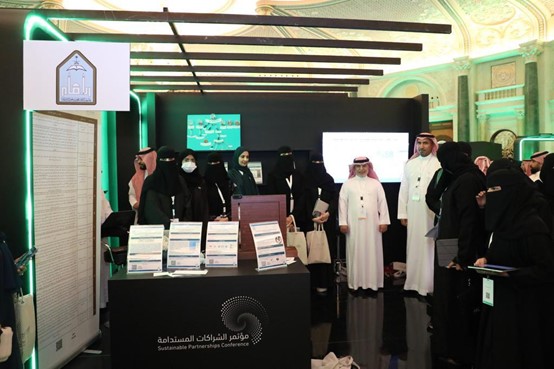
Sustainability Reporting and Transparency
In its commitment to transparency and ongoing improvement, IMSIU publishes a sustainability report on its website, detailing its initiatives, progress, and achievements related to SDG 12. This report demonstrates the university's accountability in promoting responsible consumption, reducing waste, and supporting sustainability.
Student and Community Engagement
IMSIU places a strong emphasis on involving both students and the community in its sustainability efforts. Through various awareness campaigns and student-led initiatives, the university encourages the adoption of sustainable consumption patterns. Noteworthy efforts include:
- Student-Led Sustainability Projects: The university empowers students to lead projects focused on reducing waste and promoting eco-friendly practices within the campus. This not only educates students but also creates a lasting impact on their consumption habits.
- Green Campus Ambassadors: Through the Green Campus Ambassador program, IMSIU engages students as sustainability champions who raise awareness and advocate for responsible consumption practices among their peers.
Enhancing Sustainability Through Education
In addition to its initiatives, IMSIU integrates sustainability principles into its academic curriculum, offering key courses that support SDG 12 and equip students with essential skills for promoting sustainable practices. These courses include:
Microeconomics
Examines consumer behavior and market efficiency to inform responsible consumption and production practices.
Applied Physics
Promotes the development of sustainable products and processes that reduce environmental impact and resource consumption.
Marketing Principles
Helps businesses understand strategies to promote sustainable products and practices aligned with ethical considerations.
Advanced Accounting
Covers concepts like cost management and financial analysis to support responsible business practices and sustainability.
Cost Accounting
Focuses on principles that inform responsible business practices, including waste reduction and resource optimization.
Corporate Finance
Influences businesses to adopt sustainable investments and operations that align with environmental and social responsibility goals.
General Microbiology
Highlights sustainable agricultural practices and reduces food waste through the study of microbial contamination.
Biochemistry
Supports sustainable agriculture and the development of biodegradable plastics while minimizing hazardous chemicals.
Organic Chemistry
Plays a significant role in developing biodegradable materials and reducing hazardous chemical use.
Polymer Chemistry
Contributes to the development of sustainable materials and practices.